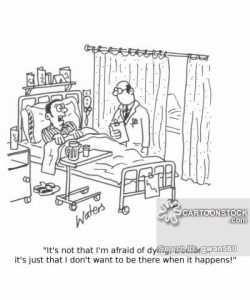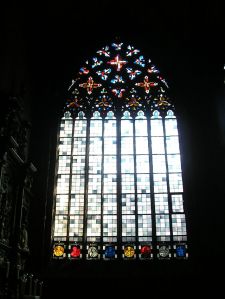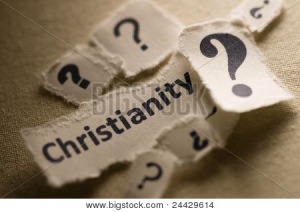
I check my WP Reader almost every day, and always find fascinating viewpoints there. Of course, I don’t agree with all of them, but my mind is always opened and that’s a good thing.
I’ve been doing a lot of thinking about the nature of God lately, and living in a Bible Belt state, I think a lot about who Jesus really was and where a belief in the Bible and God fits into my life. I happened across a couple of excellent and well written blogs about atheism here on WordPress, and I recommend both of them to Christians and those of other faiths as well as agnostics and atheists. The two websites I’m referring to are Godless Cranium and The Superstitious Naked Ape.
There’s a lot of negative stereotypes about atheists and how arrogant and intolerant they are toward religion, Christianity in particular, but I think this view is erroneous. I’m not denying there may be a few atheists out there who are arrogant and hostile toward the idea of religion, but from my readings, I don’t get that impression. I also want to clear up the idea that atheists “hate God.” How can you hate something you don’t believe exists? It’s like hating Santa Claus or unicorns.
Let me start out by saying I am not an atheist, nor do I believe I’ll ever become one. I believe in God, and I also pray. I also occasionally like to attend church services, mostly because I enjoy the aesthetics of the service and the music, particularly that of a Catholic high mass (I am not Catholic) or the joyful gospel singing of a black Baptist church. I believe there may be angels but I am not sure (or maybe I just want to believe in them). I believe Jesus provides a great example of how we should treat others. I also believe many other men and women throughout history provide examples that are just as beneficial to humanity.
But my faith, for lack of a better word, pretty much stops there. I won’t go into a long detailed account of why I think most of the Bible is bunk (especially the Old Testament), or why I don’t believe Jesus was actually the Son of God (in the divine sense), because plenty can be said about that on both of the named websites and elsewhere, by people who know a lot more about these things than I do.
I don’t believe after we die, we only have two options–Heaven or Hell. People run the gamut from nearly totally evil to very, very good, and I don’t think anyone is 100% one or the other. None of us is perfect of course, but on the other end of the spectrum, even Hitler had a couple of good points: he loved dogs and children (as long as they were blonde, blue eyed white children). To say we will either spend eternity in a place with streets of gold and lots of harps and winged beings OR in a place of fire and eternal torment by demons just seems silly and overly simplistic–why would a God of mercy and love send an average Joe or Jane, who just doesn’t happen to have accepted Jesus as their personal savior, to a place of eternal torment? It’s black or white (and to my mind, very toxic) thinking, with no shades of gray in between, and I can’t accept that way of thinking.
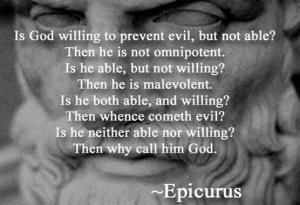
Here’s a laundry list of my problems with the idea of heaven and hell:
— If all that is required to get into Heaven is to accept Jesus as your savior, then a serial killer like Jeffrey Dahmer (who was “saved” before his execution) or another otherwise horrible person who got “saved” (and there are horrible Christians out there) would be accepted into heaven while a very good person of a faith other than Christianity, such as Gandhi or Buddha, would be burning in hell. It just doesn’t make sense, and any God who would allow such a state of affairs is no God I would want anything to do with. That God would be a sadist, a bigot, and a narcissist: basically the God of the Old Testament.
— While there is evidence of fire and brimstone under the earth (easily explained by geologic science), how is it possible that so many souls could fit into such a small space in the center of the earth? If most humans are hellbound, and even if humans have only populated the planet for 6,000 years (which I think is complete bunk), that’s a hell of a lot of souls crammed together (pun intended).
— Why would any God of mercy give Satan so much power? Is Satan God’s hatchetman, the supernatural equivalent of the good cop/bad cop meme or the company hatchetman or woman who does all the “nice” boss’s firing?
— Lots of people have never heard of Jesus Christ. If they’re all going to hell too, that’s a pretty unjust God.
— Are children who have never been baptized or told about Christianity all going to hell? That’s a cruel and sadistic God.
— What about people like me, who have tried and tried to believe in Jesus the way most Christians want us to, even praying for the gift of faith, but just can’t do it? God gave me a brain to think with, and to question things. Before I can believe Jesus Christ died on the cross for my sins and that the only way I can attain salvation is to accept Him, I need some sort of evidence proving this is so. If God didn’t want me to think and question, why would He have given me a brain?
— Most Christians (at least the evangelicals) think animals have no souls and won’t go to heaven. To me, heaven without animals would be hell. When I look into my dog’s or my cats’ eyes, I know there’s a soul there. Nothing can convince me otherwise.
–Any God who would allow the majority of human beings to suffer for all eternity just because their level of faith didn’t satisfy him, is a sadistic, evil, unempathetic narcissist. I can’t and won’t believe in a God like that. I also think threatening people with eternal damnation is a horrible way to get people to convert. If it works, then it’s a tactic based on fear and is very toxic and soul-damaging.
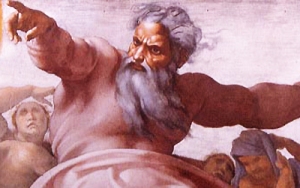
I’m not a Buddhist or any other eastern religion (I have problems with those religions too), but I actually like the idea of reincarnation. It makes more sense to me and takes into account why there’s so much suffering and injustice in the world. A difficult life may be a way of paying off karmic debt and our next life could be much easier if we pay off the debt sufficiently in this life. Or a more advanced soul could have a difficult life, because they’ve attained enough spiritual growth to be able to learn something valuable from their suffering or use it to help others. I don’t know, but it just seems much more like something a loving and merciful God would do than throw his creations into the Good Box or the Bad Box after they die, and that’s it for you for all eternity.
I take issue with any religion that only values what happens to you after you die, and fundamentalist Christianity seems to care much more about the afterlife than enjoying this life.
Christianity, as is all too often the case today, especially in America, has become very much tied up with conservative politics, and is turning off a lot of liberals who may otherwise be attracted to Christianity. I doubt if Jesus was around today, he would worship the free market economy, think helping the poor was “enabling” them, and be intolerant toward LGBT people, atheists, and women.
And that brings me to the evangelical Christian attitude toward women. According to the Bible, it was because of a woman (Eve) that man fell from grace, and because God made man first (with women being created as helpmates), the biblical view is that men have dominion over women and women should submit to their will, even when the man is abusing them. For that matter, the God of the Old Testament acted much like an abusive husband. I’m sorry, but that view is a total turnoff to me, and isn’t doing anything to win more women over to evangelical Christianity.
I know I said I wasn’t going to talk about the Bible here, but there’s something I need to get off my chest. When Christians can’t back up their arguments with reason and evidence (creationism vs. evolution is just one example), they almost always use the “But it’s in the Bible so it must be so” argument. If you try to pin them down as to why the Bible is right, all they can say is “it’s the word of God.” No. It’s the words of men, translated many times and from many different languages. The Bible can and has been interpreted differently by different Christian denominations, and even Christians can’t seem to agree among themselves what the Bible is actually saying in many cases–because it’s full of contradictions (which I won’t get into here because it would take way too long). What makes the Bible so special anyway? It’s a book. Homer’s Odyssey is a book too. Why isn’t Homer’s Odyssey taken as the word of God? For that matter, what makes one religious text right and another one wrong? Christians think Muslims are all going to hell and their Koran is the wrong holy book. Muslims think the same about Christians and the Bible. Mormons think only the Book of Mormon is the correct holy text. What makes one automatically right and the other ones wrong? If any of them were right, wouldn’t God somehow give us some sort of clue as to which text we should all be following?
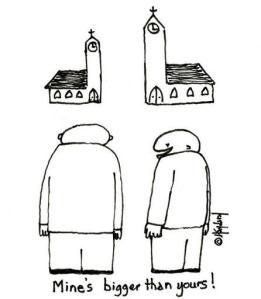
There’s a lot more things I could say, but then this article would turn into a book, so let me just sum up here with what I personally believe.
I believe God exists, and that he created the universe, but I also very much believe in scientific evidence that the earth is several billion years old and that all life on earth evolved, and was not created in 6 literal days. I think a concept known as “divine intervention” is a possibility–that is, that evolution occurred, but was overseen by God or a higher intelligence and that the evolution of human beings may have been “helped along.” Some evolutionists actually believe this view is a watered down version of creationism, and perhaps it is. I don’t dispute the idea of random evolution, but human intelligence seemed to happen too fast for that to be the case although I could be wrong. Besides, I find the idea of no higher intelligence watching over things a little frightening and to me that would seem to make all our striving and suffering a little pointless. I like to think there is some higher purpose to this life than mere physical reality.

As for the afterlife, I believe some people may go to heaven, but I don’t believe in hell, unless it’s a hell created by our own minds during this life that continues into the afterlife. I actually find the idea of annihilation after death more attractive than one of eternal torment, but I think our souls live on. Perhaps hell exists but only for the truly evil and unrepentant. I think the rest of us–who are too good for hell but not good enough for heaven–probably get reincarnated after a time of contemplating and assimilating the lessons learned in this life. I believe God is merciful and loving, and loves all his children, even those who have no faith he exists, and he would never give an evil entity like Satan (who probably doesn’t exist anyway) dominion over the majority of human souls after they die. As for Jesus, I have a lot of trouble with both the concept of his divinity and the idea of the Trinity. The first seems like a fairy tale and there’s no evidence, and as for the concept of the Trinity, I just can’t wrap my brain around it. Is there one God or three? How can God be three persons in one? Believers take it on faith alone and don’t try to analyze it, but I just can’t do that because of my analytical nature. I need to know the why’s and hows of everything before I embrace it. However, I do think Jesus was an extremely evolved soul who showed us a lot about grace, mercy and love, and I wish more Christians actually tried to follow the example of Jesus Christ in their daily lives instead of only on Sundays.
I have no idea what “religion” my beliefs make me; I suppose it’s bits and pieces of a lot of things that fit in with my worldview. But I’m open to changing my mind about a lot given enough proof.
I like to read blogs and books by atheists, Christians, and everything in between, in an attempt to understand differing viewpoints, and it saddens me that so much hatred, violence and death has occurred in the name of religion. Why does it matter if you worship a different God than I do, or even no God at all? We can all be moral and decent people who bring good to the world and to others, no matter whether we’re Christians, Jews, Buddhists, agnostics, pagans, or atheists. I wish people with different belief systems would act the way this atheist and Christian pastor do in this video, in a civil and respectful manner. These two men have completely opposite beliefs, and yet have become good friends, and I find that very heartwarming and the video is extremely interesting.
I can’t embed the video, but here’s the link:
http://www.patheos.com/blogs/friendlyatheist/2013/07/08/video-from-the-megachurch-service/

Nuff said.


 A dear friend of mine, Lucky Otter, has a blog post criticizing Christian Dominionism called
A dear friend of mine, Lucky Otter, has a blog post criticizing Christian Dominionism called 


